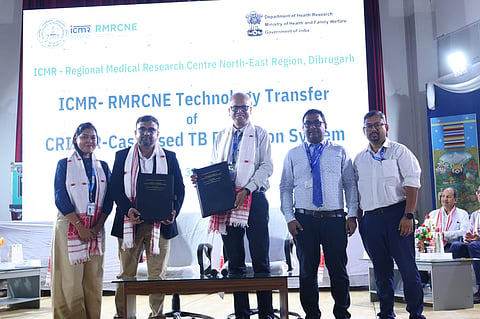
- Home
- Live Blog
- Breaking News
- Top Headlines
- Cities
- NE News
- Sentinel Media
- Sports
- Education
- Jobs

A CORRESPONDENT
DIBRUGARH: The ICMR-Regional Medical Research Centre, North East (ICMR-RMRC NE), Dibrugarh, a leading institute under the Indian Council of Medical Research (ICMR) on Wednesday announced the successful transfer of its indigenously developed CRISPR-Cas-based diagnostic technology for the ultra-sensitive and rapid detection of tuberculosis (TB) to Meril Diagnostics Pvt. Ltd., a prominent medical diagnostics company, for large-scale commercialization.
The formal technology transfer was solidified through the signing of a Memorandum of Agreement (MoA) between Dr Subarna Roy, Director (Additional Charge) of ICMR-RMRC NE, and Meril Diagnostics Pvt. Ltd. This development arrives at a crucial juncture as India intensifies its efforts towards the ambitious goal of TB elimination.
Established on July 12, 1982, ICMR-RMRC NE serves the eight north-eastern states of India, focusing on vital biomedical research, strengthening health infrastructure, and integrating traditional knowledge through a multidisciplinary approach. This significant technological breakthrough underscores the institute’s commitment to addressing critical healthcare challenges, particularly in the fight against TB, a disease that India is determined to overcome. The innovative diagnostic system, entirely conceptualized and developed at ICMR-RMRC NE in Dibrugarh, comprises three key components developed by a team led by Dr Md Atique Ahmed, Scientist D, integrating expertise across molecular biology, engineering, and software development.
There have been several players with whom RMRC NE partnered that ultimately led to the development of the technology and Assam Medical College & Hospital (AMCH), Dibrugarh was one of them. These advancements are poised to play a vital role in achieving the national TB elimination target by enabling more efficient and widespread detection. This indigenous platform represents a significant advancement in creating affordable and scalable point-of-care diagnostics, particularly crucial for underserved regions. By enabling rapid and accurate diagnosis at the community level, this technology directly supports India’s aggressive strategy to identify and treat all TB cases with indigenously developed technology.
The MoA-signing ceremony at the centre was attended by senior scientists, government officials, and industry leaders. This collaboration signifies a crucial step towards making this home grown TB diagnostic technology widely accessible, bolstering India’s determined efforts in its mission to eliminate tuberculosis.
“This innovation bridges high-end molecular biology with real-world field utility. We’re proud to contribute a made-in-India solution for a disease that remains a major national health challenge, and we believe this technology will be a crucial tool in achieving India’s ambitious goal of TB elimination,” stated Dr Md Atique Ahmed, Scientist D and Principal Investigator.
Also Read: Assam: May Day observed in Tamulpur district
Also Watch: